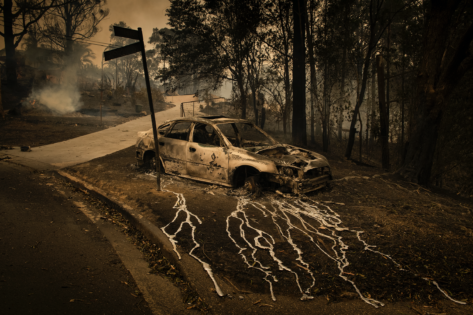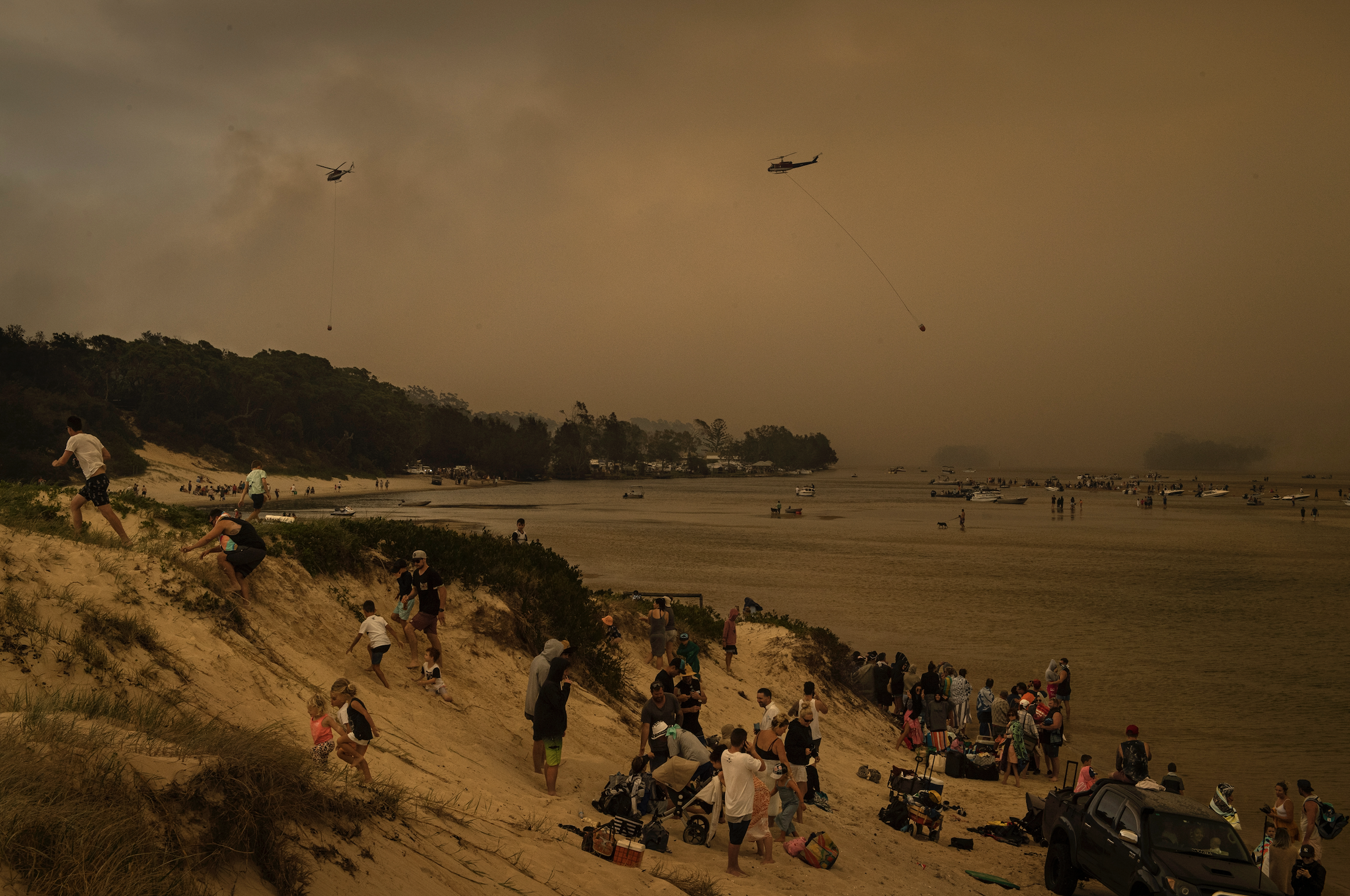ONE YEAR ON
By Tom Wolff
In early January of 2020 I drove down the Hume Highway, leaving my home in Northern NSW to drive to Canberra. My first week of work for the year was to take group of refugee kids on a bush camp. As I passed into Ngunnawal Country – whose borders delineate an area very similar to that of the ACT – I felt like I was driving into the apocalypse. The orange haze blanketing the sky meant I couldn’t see more than a couple of hundred metres in front of my car. It felt claustrophobic, like the world was slowly choking. The air was thick with the smoke. As I crossed the single lane Tharwa Bridge that spans the Murrumbidgee River I reflected on its Ngunnawal name, meaning, “pathway of the leaders/elders”. As the fires burned the only person who seemed to be leading us was the RFS commissioner. The Prime Minister was nowhere to be seen.
But in light of the failures of leadership, something more important shone through in the Australian psyche in 2020 – the collective power of our communities. Across the country people banded together to fight fires on the frontlines, then banded together to fight a pandemic. For all the trauma, 2020 has seen change for the better. We’ve experienced the power of community action first-hand and we’ve called out bullshit when we’ve seen it. A year on from the Black Summer, I spoke to a couple of people directly involved with the fires about recovery, community resilience and hope for the future.
THE NORTHERN RIVERS
On my way home from Tharwa I dropped in to see Hannah Magnall, who was building her own place in the bush out behind Crescent Head. Hannah and I first met up north, when we worked in adjacent cafés in Lennox Head. It didn’t take long for us to start talking surfboards and I soon bought one of Hannah’s first handshapes – a beautiful 9’6” log she built in the winter of 2016 that now has its place on the rack alongside three other of her Ways Away surfboards in my garage.
Before she moved to Crescent earlier this year, Hannah spent much of the last bushfire season on the frontlines in Northern NSW. Working for the Forestry Corporation, she was part of the gargantuan community effort to fight fires around Rappville, Woodenbong and Kyogle. She didn’t surf or shape for eight months. “I just put it all on hold” she explains with a dutiful tone. Hannah isn’t one to dwell on her own contribution and instead ponders the efforts of people in the community. She begins with a tale of the female publican at the Woodenbong Hotel where she stayed for the duration of her firefighting efforts. “She was the one pouring beers and running food – literally one lady – and she was working harder than anyone just trying to feed everybody.” In the same vein, she mentions the family who ran the local servo. They’d stay open and run jerry cans of fuel all over the area. It’s these “thankless jobs” that Hannah felt were not really talked about yet were an integral part of the wider firefighting efforts. Wildlife carers, the army making lunches every day. “Anything that needed to be done was done,” she explains.
Hannah thinks about the diversity in Australian communities and how it flourishes during times of crisis. “You’d end up in a car talking to the army on one side and then some local bloke telling them where to go.” She saw it as, “a real show of what Australian communities can do when they’ve all got a common end game.” That intimate knowledge of country that locals possess became a precious resource during the fire season. “We’ve got all the gear but they’ve got all the knowledge of Country.”
Hannah recently returned to the burned areas she’d fought to save. Seeing it a year later and knowing the intensity of that fire – “the style of fire that went through that country” – gave her a unique insight into interpreting the recovery. While some forests may return much as they were, other areas have been irreversibly altered by the power of fire. We gaze out over Hannah’s new plot of Country. “I’ve learned a lot about myself and about the country in which I was working. I started firefighting four years ago and I’ve had a fair bit of experience with fire over those years leading up to last year. Fire’s something you’ve got to be around a lot to start to understand.”

THE SOUTH COAST
With much of my year spent working in the ACT, I made regular jaunts to the South Coast for surf. It was in this region that some of the most intense and destructive fires in the country burned through December and January. My first journey down the Kings Highway after the fires from Canberra to Batemans Bay presented me with a stark, burnt landscape. As the road lurches off the escarpment and down towards the coast I was conditioned to the thick and verdant forests of tree ferns and enormous eucalypts. It now looked remarkably different.
The area known as the Budawangs was a scorched blackness. The distinct lack of any vegetation meant you could see the intricacies of the landscape; the deep gullies where some hints of green remained, the long spurs like fingers reaching out into a valley that had been charred. As I pulled my off the road and stepped out of the car I was greeted by a deafening silence. Where were all the birds? As I walked off into the landscape my shoes sunk deep into ash. It was black as far as the eye could see. This same landscape now shows signs of new life – from the green epicormic growth poking out of eucalypt trunks to the xanthorrhoeas shooting out new strands of life from their blackened stumps. The South Coast was finally blessed with rain, and lots of it.
When Brett Burcher picks up the phone in Ulladulla it’s December and he’s just had his first surf of the school holidays. Being a primary teacher at Milton Public he usually doesn’t have time for the early. The clear weather down south stands in stark contrast to a year earlier. “The kids are actually going to get a holiday this year,” offers Burch. “Last year was probably the gnarliest time of their life, and no one got a break. That goes for everyone – every job, every role – nobody got a rest last year. It was a long year. It just went on and on.”
Brett concedes he’s been pretty lucky – he didn’t lose his home and was able to keep his job. He assures me there’s still people doing it tough but offers a positive note by saying that it feels to him like no one’s been left totally defeated. “I just feel like this year everyone will get a break. Everything’s growing, the towns should get an injection of money and then hopefully with that rest, with that new lease on life, some effective things will come into play to prevent it ever being that bad again.”
I ask Brett about community organisations that were set up during the fires. “Treading Lightly were just starting to find their feet as a community support base. They became the organisation that managed a lot of the recovery. If you had food to deliver, or any resources, you’d go via them. So many people wanted to help out but we almost got inundated and they really took on the role of distributing information to the community, collecting food, dealing with any political stuff – they just felt like a home for people who had recently arrived in the area, and for old locals too.”
Burch is full of praise for Monica Mudge, who heads Treading Lightly. He explains that her diplomatic nature is ideal as the organisation represents a wide range of voices within the community. He credits Mon and Treading Lightly for, “binding our community together during its toughest year.”
Conversation shifts to the current state of things on the South Coast. “We’ve had lots of rain and there’s definitely not that feel like it’s going to happen again this year.” I was going to ask Burch whether his final words from the article in SW411 still rung true, when he spoke of his impending fear of a repeat of the Black Summer in the 20/21 fire season, but he’s beaten me to it. Contemplating that statement with the benefit of hindsight, he feels a little differently. “That was probably said in a raw way where I was just thinking, ‘fuck every summer’s going to be this hot now.’ While climate change is obviously still having its effects, we’re still seeing those natural seasons occurring. Look at what La Niña is doing right now.”
I ask if there was anything that stood out from the kids at Milton Public this year. Burch has his answer straight up. The School Captain was a girl named Grace, whose family had lost their home in the fires. The week before we talked, she’d made a speech to the whole school on behalf of the graduating class of 2020. “She just wrapped up the year and spoke about how unique it was to be a school captain in such a crazy year,” recalls Burch. “It literally just blew me away. The thing that came out of that for me was just the resilience of a 12-year-old girl. I was just thinking, ‘I swear she must have grown up five years this one year and she wouldn’t even know it.’”
